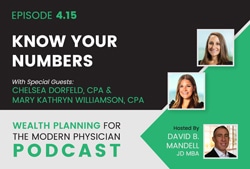In episode 4.15, host David Mandell chats with Mary Kathryn Williamson, CPA and Chelsea Dorfeld, CPA from the firm Aprio, who specialize in serving medical and dental practices. They share insights on managing finances, increasing profitability, and understanding key numbers in a healthcare practice.

(Video Available April 18, 2024)
The discussion covers the importance of understanding financials, key performance indicators, and strategies to increase profitability in a healthcare practice. David, Chelsea and Mary Kathryn also cover the impact of staffing costs, the potential benefits of fee-for-service models, and the importance of regular financial reviews.
TAKEAWAYS:
- Understanding, analyzing, and managing financial numbers are key to optimizing a medical practice’s profitability:
Much of the discussion focused on the importance of understanding numbers in a medical practice. According to Williamson, “this should not be a once-a-year conversation. It needs to be ongoing, so you constantly know and everyone is on the same page. Having your team all on the same page is extremely beneficial.” She underlined that the key to a practice’s profitability lies in constant monitoring, understanding, and managing of numbers.
Dorfeld pointed out that the numbers they refer to are not confined to revenues alone, but also encompass significant expense items, such as labor, supplies, occupancy, and labs. She stressed that it is imperative to “know the buckets of expenses, knowing where your labor’s at, knowing where your rent’s at, and then picking an expense and like, all right, we’re going to get this one in check.” This helps in identifying and focusing on one issue at a time, which could be the quickest route to increasing profitability.
As Williamson highlighted, “staffing has been the biggest right now so far,” and suggested that practices should keep an eye on turnover, which could prove extremely costly due to the resources involved in retraining. She also pointed out other significant costs like supplies, labs, and rent, and the importance of renegotiating leases or working with new suppliers to manage these expenses.
- Regularly evaluating and adjusting fees is crucial for practices that have control over what they charge:
Mary Kathryn Williamson emphasized the importance of evaluating and adjusting fees for practices that have some control over their own fees. “If you are fee-for-service, there should be no reason that you don’t raise your fees every single year,” she stated. She argued that a fee analysis should be conducted every two years to understand the baseline and how it measures up against other practices.
For physicians who are subject to Medicare or private insurer fee schedules, Williamson suggested focusing on fee negotiations and identifying low payers. She noted, “There’s no point in having all the effort and resources to try to track down all of those collections.” For those considering a switch to a fee-for-service model, understanding the patient base is crucial. Williamson emphasized, “You have to know your patient base. You have to know if you make this switch are you going to lose half your patients?”
Lastly, she highlighted the importance of taking into account the rising costs in the market. Understanding these factors can play a significant role in making strategic decisions about raising fees or focusing more on fee-for-service models.
- Proactive, forward-looking advice is more beneficial than mere tax preparation:
Both CPAs stressed the need for proactive, forward-looking advice rather than just looking backwards. Dorfeld mentioned that CPAs at Aprio aim to build relationships with their clients to become more of an advisor and help them grow and build their practices while minimizing their tax liabilities. She said, “While we do handle taxes for our clients, we really like to build the relationships with the clients to become more of an advisor and help them grow and build their practices however we can.”
Similarly, Williamson noted that the value of their service lies in the value-add conversations about the clients’ financials that feed into tax returns. She said, “The proactive thinking, the proactive conversations, I feel like is what sets us apart at Aprio.” By taking a more proactive approach, CPAs can provide valuable insights and advice that can help practices manage their finances more effectively and efficiently.
INSIGHTS
- Staffing costs have risen significantly across the board since COVID, affecting the profitability of healthcare practices.
- Regularly reviewing and renegotiating expenses such as lease agreements and supply costs can help maintain profitability.
- Understanding your patient base is crucial when considering changes such as raising fees or switching to a fee-for-service model.
- Regular financial reviews and proactive planning are essential for managing a healthcare practice efficiently.
- It’s important to know your numbers, including revenues, collection times, and percentage of collections.
LINKS:
- Guest, Mary Kathryn Williamson, Bio
- Guest, Chelsea Dorfeld, Bio
- www.aprio.com
- Host, David B. Mandell, Bio

